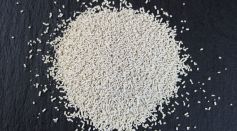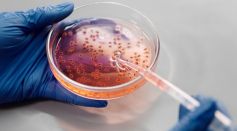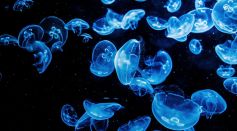Tags: Cell

Potential of Bacteria Demonstrated to Help Produce Protocells Emulating Real-Life Functionality

Gene Therapy Prevents Blindness in Children With Leber Congenital Amaurosis, NPHP5 Deficiency Expained

New Nanowire Sensor Can Monitor Cardiac Tissue Activities

Scientists Add Human Genes and Transform Single Cell Baker's Yeast to a Humanized Version

Locust Can Detect Cancer From a Healthy Human Cell and May Speed Up Standard Screening [Study]

Scientists Identify the Cytokine Responsible for Hair Loss, Baldness; Stem Cell Is the Solution [Study]

HIV-Infected Cells Susceptible to Specific Targeted Therapies, New Insights Reveal

SARS-CoV-2 Found on Neurons and Blood-Brain Barrier Cells Use Nanotubes to Make its Way to the Brain, Study Claims

Lab-Grown Pork Sausages Cultivated From Single Cell Resembles Natural Growth of Muscle, Fat

New Evidence Shows Cell Mechanisms in Human Brain That Could Affect Alzheimer's Disease

Lab-Made Parasitic Worm Can Kill Cancer Cells, Study Claims

Sea Anemones From Phylum Cnidaria 'Secretly' Evolves and Repurposes Neurons to Stinging Cells Called Cnidocytes [Research Study]

Bacteria in Biofilms Present in Sewer Pipes, Kitchen Counters, Human Teeth Smarter Than Previously Thought

Lymphoma Cell Growth and Survival: New Study Shows Targeting ATF4 Gene Could Help Kill Cancer

Cholesterol-Lowering Drink: Study Reveals How Green Tea Helps Kill Cancer Cells, Makes People Live Longer

COVID-19 Face Mask Glows to Tell If You're Positive with the Virus

Glowing Neurons: Genetically Modified Jellyfish Gives Light on How Human Minds Work
Herpes Virus Invades the Nervous System, Study Reveals Its Complicated Hijacking Sequence

Link Between Obesity and Periodontal Disease Found; Research Shows How Inflammation May Trigger a Cell Breakdown
DNA Reveals Brain Differences Between Humans and Chimpanzees; Researchers Grow 2 Cell Types to Compare
Most Popular

Largest Known Volcanic Aquifer Discovered Beneath Oregon's Cascades

New 'Supergiant' Sea Bug Found in South China Sea, Named After Darth Vader

Mediterranean Sea Was Refilled by a Catastrophic Flood Millions of Years Ago

Mysterious Cosmic Waves That Sound Like Birds Detected in Unexpected Space Region





